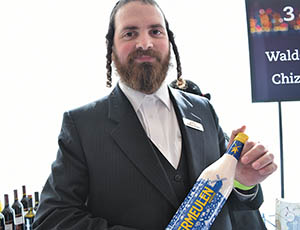




Most of us are familiar with Royal Winery’s Bartenura Moscato, a sweet, low-alcohol sparkling wine with notes of pear, tangerine, nectar and melon flavors packaged in the familiar blue bottle. Yet, it is surprising to note that the wine is the best-selling Moscato in America, with the vast majority of its sales coming from outside the kosher market. An article on wine website VinePair notes that Bartenura Moscato is a favorite among celebrities and the hip hop community, with one Harlem resident, who only allows Bartenura wines into her house, collecting empty Moscato bottles to make into a kitchen wall clock, a whimsical blue glass reminder that it is always “Bartenura time.”
The changing face of the kosher wine scene was clearly evident at this year’s Kosher Food and Wine Experience, an annual event that allows wine and spirit makers, as well as those in the kosher food business, to woo potential customers with tastes of their most promising products. Held this past Monday at Pier 60, the event attracts kosher gourmands by night with a public event featuring wines and food tastings from area eateries, and draws members of the wine and liquor business by day with a selection of both wines and spirits. Diversity and a passion for excellence were both evident throughout the afternoon event that had long-bearded Chasidim standing elbow to elbow with men and women of assorted nationalities and religions, swirling their stemmed glasses in unison to maximize the flavor of the wine they were about to sample.
As the quality of kosher wines continues to improve, kosher wines are going mainstream in a big way, according to Jay Buchsbaum, director of education for Royal.
“Moscato was the first example of that,” said Buchsbaum. “It is the number-one Moscato in the United States, and 90 percent of the drinkers who purchase Moscato don’t keep kosher. At least 40 percent of the wines here today, and maybe as high as 65 percent, are as good as or better than their non-kosher counterparts.”
Because wine is by nature an inherently kosher product, a rabbinic stamp of approval does not necessarily translate into a higher price tag. While it can cost more to make a small run of kosher wine, wineries that produce exclusively kosher products are bottling extremely affordable, high-quality vintages, drawing mainstream consumers to the kosher wine market. Buchsbaum noted that Baron Herzog’s California wines, many of which are priced between $12 to $14 a bottle, can run approximately ten dollars less than equivalent wines. Kosher wines from Israel, Spain and Italy are also attracting interest from the non-kosher wine trade according to Buchsbaum, who has high hopes for continued expansion of the kosher wine market beyond the Jewish community.
“It is going to take time, but people are going to notice that these wines shouldn’t be limited to just the kosher section, because they are so good,” said Buchsbaum.
Event organizers estimated that 1,800 people attended this year’s show, with over 900 bottles of wine being poured before the day’s end.
Some of the new products on display were a new flavor from Walders whose popular Vodka & Vanilla and Scotch & Coffee liqueurs can be served straight up or mixed into cocktails. Schraga Schapira of Walders said that company’s Banoffee liqueur is expected to debut by June.
“It is a nicely balanced banana toffee mix,” said Schapira. “It is a completely new flavor. No one has anything like this.”
Husband and wife team Ellen and Gershon Bodner of Morad Wineries in the Galil flew in from Israel with a full display of fruit wines in flavors such as red grapefruit, pomegranate, lychee, etrog, limoncello, amaretto, double espresso, chocolate and the company’s best seller, passion fruit. Other flavors sold in Israel that have yet to make their way across the Atlantic are melon, apple, honey and wild berry.
“You name it,” said Gershon Bodner, who remarked that his winery’s visitors’ center typically has approximately 30 different flavors available at any given time. “There is no fruit I can’t make wine out of.”
Bodner said that the secret to Morad’s success is the vineyard’s capability to retain the full fruit flavor in the winemaking process. He estimated that his company’s sales have doubled in the United States every year for the past five years.
A mathematician and former engineer, Bodner stumbled into the wine business almost by accident five years ago. Asked by his brother to join him on a tour of a local Israeli winery, Bodner found himself captivated by the dessert wines he sampled. A tour guide explained that the winery produced just small batches and visitors would often buy bottles to enjoy at home.
“I tasted the wine and it was good,” said Bodner. “I didn’t want to buy small quantities. Instead, I bought the winery.”
By Sandy Eller
Sandy Eller is a freelance writer who writes for numerous websites, newspapers, magazines and many private clients. She can be contacted at sandyeller1@gmail.com.














